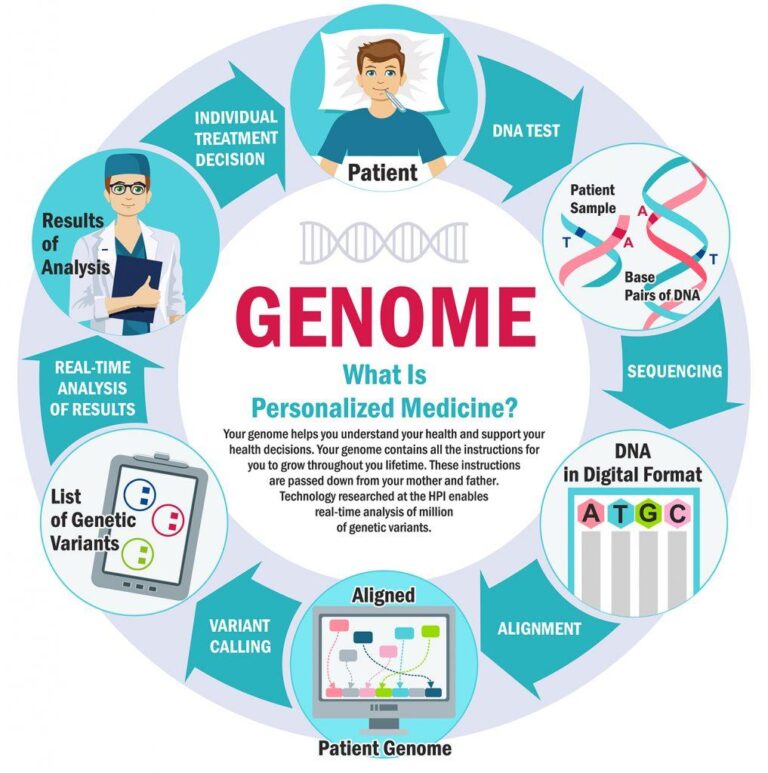In recent years,genetic testing has rapidly evolved from a niche scientific tool into a cornerstone of modern healthcare.As personalized medicine continues to gain momentum, the ability to analyze an individual’s genetic makeup is revolutionizing how diseases are diagnosed, prevented, and treated. By providing insights tailored to each person’s unique genetic profile, genetic testing is paving the way for more precise, effective, and proactive medical interventions. In this article, we will explore how genetic testing is transforming personalized medicine, highlighting its potential to enhance patient outcomes and reshape the future of healthcare.
Table of Contents
- The Role of Genetic Testing in Tailoring Treatment Plans
- Advancements in Genetic Technologies Enhancing Diagnostic Accuracy
- Integrating Genetic Data into Clinical Decision Making for Better Outcomes
- Best Practices for Incorporating Genetic Testing into Personalized Care
- In Summary
The Role of Genetic Testing in tailoring Treatment Plans
In today’s medical landscape, genetic testing serves as a cornerstone for precision healthcare, enabling clinicians to design treatment strategies that align closely with an individual’s unique genetic makeup. By decoding the genetic facts that underpins each patient’s biology, healthcare providers can predict drug responsiveness, minimize adverse reactions, and select therapies with the highest probability of success. This nuanced approach not only enhances therapeutic efficacy but also reduces the trial-and-error period traditionally associated with treatment selection.
Key benefits of incorporating genetic testing into treatment planning include:
- Optimized drug dosing: Tailoring dosages based on metabolic gene variations to maximize effectiveness and safety.
- Identification of hereditary risks: Informing preventive measures and early interventions for inherited conditions.
- Targeted therapy selection: Leveraging biomarkers to match patients with the most appropriate molecular therapies, particularly in oncology and rare diseases.
- Reduction in adverse effects: Avoiding medications likely to cause harmful side effects due to genetic predispositions.
Advancements in Genetic Technologies enhancing Diagnostic Accuracy
recent developments in genetic technologies have substantially sharpened the precision of medical diagnoses. Techniques such as next-generation sequencing (NGS) and CRISPR-based diagnostics enable clinicians to detect minute genetic variations responsible for complex diseases. These tools provide a complete genetic profile quickly and at reduced costs, allowing for earlier detection and intervention.Consequently, doctors can tailor treatment plans not just based on symptoms but on an individual’s unique genetic makeup, drastically improving health outcomes.
The integration of artificial intelligence with genomic data further revolutionizes diagnostic capabilities. Machine learning algorithms analyze vast datasets to identify patterns and predict disease progression with remarkable accuracy. This synergy highlights key advantages including:
- Enhanced mutation detection beyond conventional methods
- Real-time data interpretation facilitating rapid clinical decisions
- Expanded potential for discovering novel biomarkers that indicate disease risk or drug response
Collectively, these innovations pave the way toward truly personalized medicine — transforming patient care from reactive to proactive and highly targeted.
Integrating Genetic Data into Clinical Decision Making for Better Outcomes
Harnessing the power of genetic data has become a cornerstone in refining clinical decisions. by decoding an individual’s genetic makeup,healthcare providers can identify predispositions to certain diseases,predict responses to medications,and tailor prevention strategies with unprecedented accuracy. This personalized insight goes beyond traditional diagnostics,enabling clinicians to devise treatment plans that are uniquely suited to the patient’s genetic profile. The integration of genetic information into routine clinical workflows also minimizes trial-and-error approaches,significantly reducing adverse drug reactions and improving overall therapeutic effectiveness.
Key elements driving this conversion include:
- Pharmacogenomics: Customizing drug prescriptions based on gene variants that affect metabolism and efficacy.
- Risk assessment tools: Predicting susceptibility to hereditary conditions for preemptive care.
- Genomic data integration: Seamlessly combining genetic results with electronic health records for holistic patient management.
As genetic databases expand and analytic technologies evolve,clinicians are equipped to make more informed decisions that lead to better patient outcomes,marking a paradigm shift towards truly personalized medicine.
Best Practices for Incorporating Genetic Testing into Personalized Care
Integrating genetic testing into personalized care requires a meticulous approach that prioritizes both patient understanding and clinical relevance. Clarity in communication is paramount; healthcare providers should ensure that patients fully grasp the implications of their genetic results by using accessible language and providing comprehensive counseling. This includes discussing potential outcomes, privacy concerns, and the possible emotional impact. Additionally, collaboration across multidisciplinary teams—comprising geneticists, primary care physicians, and specialists—helps in interpreting results accurately and crafting tailored treatment plans that align with the patient’s unique genetic profile and medical history.
Equally critically important is the adoption of robust data management and ethical standards. Providers should employ secure, compliant platforms for storing genetic information, safeguarding patient confidentiality at every step. To maximize benefits, genetic testing should be integrated early in the diagnostic process, enhancing prevention strategies and therapeutic decisions. Best practices also encourage continuous education for clinicians to keep pace with advancements in genomics and to refine personalized care protocols accordingly. By embedding these strategies, personalized medicine transcends generic approaches, offering optimized, patient-centric solutions grounded in genetic insight.
In Summary
genetic testing stands at the forefront of a new era in personalized medicine, offering unprecedented insights into individual health profiles. By enabling tailored therapies, early interventions, and informed lifestyle choices, it reshapes how we approach disease prevention and treatment. As technology advances and accessibility improves, genetic testing will continue to deepen its impact, driving more precise, effective, and patient-centered healthcare solutions. Embracing this transformation not only enhances medical outcomes but also empowers individuals to take proactive control of their health journey.

